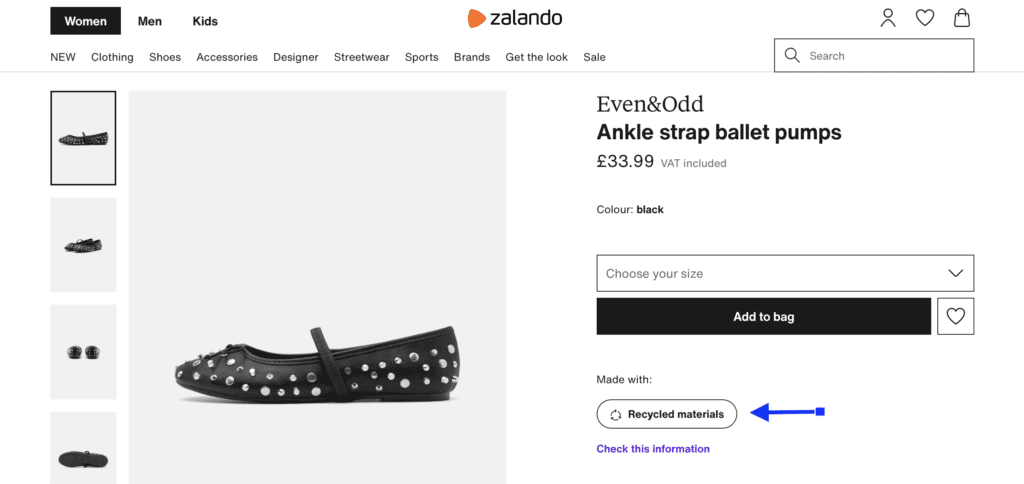Zalando will make significant changes to how it promotes the so-called sustainability of its offerings, following a brush with regulators in the European Union. In a statement on Thursday, the European Commission confirmed that Berlin-based Zalando, which offers up a wide array of apparel, footwear, and accessories via its e-commerce platform, “has committed to removing misleading sustainability flags and icons displayed next to products offered on its platform” by April 15, 2024, as such claims “can mislead consumers about the environmental characteristics of the products.” Instead, the EU market regulator stated that Zalando will provide consumers with “clear information about products’ environmental benefits, such as the percentage of recycled materials used.”
Specifically, the European Commission, which is tasked, in part, with ensuring the proper application of EU legislation, revealed that Zalando has committed to: (1) removing the initially used sustainability flag from all webpages; (2) removing all misleading environmental icons that were displayed next to products (such as a leaf or a tree); and (3) removing the icons and the term “sustainability” also from the filter and allowing consumers to filter and select products based on specific product qualities.
Additionally, Zalando has committed to: (4) “providing clear and specific information on the product’s environmental and/or ethical benefit at the product detail page:” (5) revising the “Sustainability Page” by introducing two new webpages (one with more information on the product standards and one with information about Zalando’s sustainability-related approaches and strategies); and (6) ensuring that its environmental claims are “based on aspects which are significant for the environment.”
Maybe most interesting, however, is the fact that Zalando says it will no longer use the term “sustainability” or any “other unjustified terms indicating an environmental and/or ethical benefit,” and instead, will “provide clear information about the specific product, for example, a percentage figure of how much recycled material is used.”
Seemingly not limited to an isolated effort on Zalando’s part, the retailer now has to submit a report on the implementation of its commitments to the Commission, which states that based on that report, the Consumer Protection Cooperation Network will make assessments and “where necessary, enforce compliance, for example, by imposing fines or removing content.”
The parties have not provided much background on Zalando’s sudden change of tune, aside from revealing that Consumer Protection Cooperation, the Commission and four authorities from Germany, Denmark, Norway, and Sweden initiated “a coordinated action with Zalando” in April 2022. By way of background, the Commission also noted on Thursday that under EU rules, “businesses must provide truthful information to consumers and have to refrain from misleading consumers to influence their choices,” suggesting that the commitments do, in fact, follow from a probe that focused on the veracity of Zalando’s sustainability-centric marketing.

The apparent probe into Zalando comes a few years after the Commission conducted a sweeping probe into hundreds of websites in 2021. The EU revealed that in 42 percent of cases, the “green” claims that appear on apparel/accessories, cosmetics and household products companies websites in the EU are “exaggerated, false or deceptive.” A subsequent examination of 344 “seemingly dubious claims” resulted in a finding that “in more than half of the cases,” sustainability claim-making companies do not provide “sufficient information for consumers to judge the claim’s accuracy,” according to the Commission, while in 59 percent of cases, the company did “not provide easily accessible evidence to support its claim.”
In connection with that headline-making market study, the Commission found that in 37 percent of the cases, the potentially problematic claims included “vague and general statements” about a product, such as it being “‘conscious,’ ‘eco-friendly,’ and/or ‘sustainable,’” which the European Commission said is language that aims “to convey the unsubstantiated impression to consumers that a product had no negative impact on the environment.”
THE BIGGER PICTURE: The action against Zalando paired with the Commission’s apparent willingness to use EU rules on unfair commercial practices to enable national enforcers to curb a broad range of unfair business practices should serve as a warning to fellow retailers and fashion industry entities that are making claims in the realm of sustainability in their advertising/marketing in order to reach eco-conscious consumers. Based on the action at hand, the potential for regulatory intervention does will not merely stem from the publication of objective assertions that may be misleading, such as claims about the recyclability of a product and/or its components or about offerings’ “eco-friendly” contents (that lack to necessary substantiation/qualifications). Regulators may also take issue with the use of general eco imagery and icons and even the use of largely vague terms like “sustainability.”

